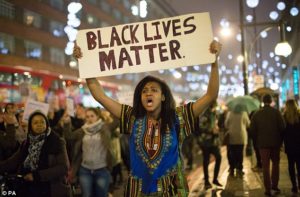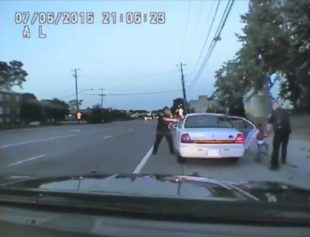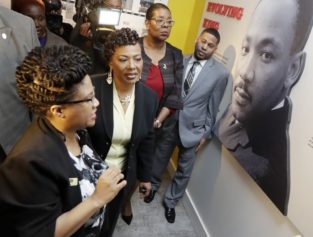A new poll by the Pew Research Center shows a year of high-profile police killings and intense activism by groups like Black Lives Matter, may be changing the nation’s views on race.
According to an article on the Pew website, roughly six-in-ten Americans (59 percent) say the country needs to continue making changes to achieve racial equality, while 32 percent say the country has made the changes needed to give Blacks equal rights with whites. The article states that a year ago, public opinion was much more closely divided on the question of race.
The Pew Research Poll interviewed 2,002 Americans over the phone last month. More than half of the interviews were conducted via cell phone. The rest of the calls were to landlines. More than half of the people polled (1,375) where white, 212 were Black and 239 were Hispanic.
The poll also revealed there is still a racial divide on how much work the nation needs to do to improve opportunities for racial minorities. About half of white people polled said more needs to be done to achieve racial equality, while more than two thirds of Black people said the same.
“Though a substantial racial divide in these views remains, [53 percent of whites] now say more needs to be done,” according to Pew. “Last year, just 39 percent of whites said this. And although large majorities of African Americans have consistently said that changes must continue to be made to achieve racial equality, the share saying this now (86 percent) is greater than in the past.”
The poll data also revealed half of the people surveyed thought racism was still a problem, which was up from five years ago, when only 33 percent of people surveyed said racism was a problem.
But again, there was a racial divide in opinion. The majority of Blacks and Latinos polled said racism was a problem, while less than half of whites agreed.
“Nearly three-quarters of African Americans (73 percent) now characterize racism as a big problem, along with 58 percent of Hispanics. Although whites are far less likely to say racism is a big problem (44 percent), the share of whites expressing this view has risen 17 points since 2010,” reported Pew.
The poll findings came as a pleasant surprise to activists protesting police killings, according to The Los Angeles Times.
“‘Man, that’s good, that’s huge,” said Tony Rice, a prominent Ferguson activist.
The LA Times reports that Rice has spent considerable time over the last year on a campaign to persuade white and Black voters to recall Ferguson’s mayor. He also said that white residents have often told him that the news during the last 12 months has caused them to rethink racial issues.
The protests against police violence in Ferguson became an international story and made race issues a top priority that even the presidential candidates had to address.
“Race appears to be more front and center than it has for a while,” said Carroll Doherty, director of political research at Pew.
However, it remains to be seen if the renewed focus on race will lead to policy changes.
“‘It’s one thing to say more needs to be done about racial equality in general terms and another to support specific policies,” Doherty told the LA Times.
Media analysts attribute much of the change to increased use of new communication platforms like Facebook and Twitter.
“Social media have taken conversations that in the past would have taken place in ‘private spaces’ and made them visible to a wider community,” Meredith Clark, an assistant professor at the Mayborn School of Journalism at the University of North Texas who is conducting a research project on the Black Lives Matter movement, told the LA Times. “That has made it possible for people to encounter views they might have been too uncomfortable to ask directly about.”
Rice, the Ferguson activist, said new technology such as social media and cell phones makes it difficult for white Americans to ignore the problems Black people have been dealing with for a long time.
“They said, ‘We had no idea what you guys were being treated like,” Rice told the LA Times. “My thing was, ‘Hey, we tried to tell you, you just didn’t listen.’ Now they’re starting to listen.”



